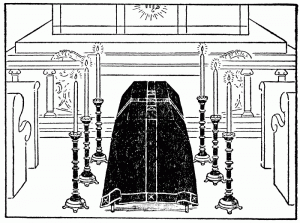 From a reader…
From a reader…
QUAERITUR:
I have heard that there is an ancient tradition in which a newly ordained priest offers either his first Mass or one of the following Masses for the souls of the faithful departed, specifically for his deceased family members.
I ask because I recently saw some photos of a newly ordained priest (Deo Gratias) from Brazil, offering his first Mass in the OF: black vestments, biretta, etc for the faithful departed.
If you have any insights, thoughts, or information on this, may I ask your opinion? Thank you in advance.
I don’t know how “ancient” that tradition would be, but, yes, there are variations of this practice. It could be a fitting start to priestly ministry.
As far as one of the first Masses being a Requiem is concerned: imagine a new priest, thinking with gratitude about the role that his deceased parents or grandparents and others played in bringing him to the altar. He would, quite properly, want to “return the favor” as it were.
At the same time, any Mass can be offered for the intention of the living or of the dead. A Mass celebrated for the intention of the deceased doesn’t have to be a Requiem Mass.
My hope is that, soon, all newly ordained priests will have the opportunity to celebrate their First Mass in the Extraordinary Form, and even solemnly.
If a newly ordained priest wants to celebrated a Solemn Mass, and were he able to get around a little bit, perhaps we of the TMSM could be of help.


































St John Paul II did this, as I recall reading, for his first mass, or perhaps second. But I believe, owing to the postwar circumstances and his loss of all his family, a “private” mass in a crpyt or private chapel.
I recently attended the FSSP ordinations in Lincoln and saw that this is actually part of the Rite for Ordination of Priests in the 1962 Roman Ritual:
Final Exhortation
The bishop sits down and speaks a final word to the ordained, saying:
My dear sons, ponder well the order you have taken and the burden laid on your shoulders. Strive to lead a holy and devout life, and to please almighty God, that you may obtain His grace. May He in His kindness deign to bestow it on you.
Now that you have been ordained to the priesthood, may I ask you, after you have offered your first Mass, to celebrate three other Masses, namely, one in honor of the Holy Spirit, a second in honor of blessed Mary, ever a Virgin, and a third for the faithful departed. I ask you also to pray to almighty God for me.
Mass is concluded as usual.
The dear Vince K beat me to what I was going to say.
That said, a requiem is very fitting (and by the Pontifical, also required?) for one of the first Masses; I consider it somewhat unfitting for the very first. Requiems necessarily and fittingly have a somber and, for a priest, also a daily-business tone…
Also, from what I heard why of course everyone can pray for everything in Masses, including the priest: in the specific sense of Mass intentions, a non-black Mass can be offered for the faithful departed, but a Requiem cannot (a.f.a.i.k.) be offered for the living.
Celebrating a Requiem for a first Mass would be very untraditional for the the reason that the traditional days for ordinations are the Saturdays in the four Ember Weeks and Holy Saturday. This very old tradition dates from the time of Pope Gelasius (492-496). Having been ordained on Saturday, the priests would offer their first Masses on Sunday. Since a Requiem Mass is not allowed on Sunday, they could not offer a Requiem Mass as their first Mass.
However, if they can choose the intention for the Mass, there’s nothing to stop them from celebrating the Sunday Mass with the intention of the repose of the souls of their parents (if dead) or for their health and salvation (if alive).
Boniface: St John Paul II was ordained on All Saints Day, and with the next day being All Souls Day he celebrated – as was (and still is?) allowed, three consecutive Masses. The first was for the repose of the souls of his parents. He celebrated it in the crypt of Wawel Cathedral in Krakow.
Back pew, thanks for adding the detail. I couldn’t remember if he was ordained Nov 1 or 2, so didn’t mention it, and was too lazy to get up and look it up in one of my biographies of him. As I recall, one of those first masses was for his deceased family members. What a great man he was.
I have the good fortune of being close to a parish that does the three masses back to back, EF, on All Souls -it is still very much allowed, in both forms, as I recall – isn’t it a great thing?
Even under the Code of Canon Law of 1917, which in many respects was not traditional, to be ordained on a day other than the Ember Days (and perhaps Sitientes Saturday), with preference going towards the Ember Saturday in Advent, required an indult, which the Americans regularly applied.